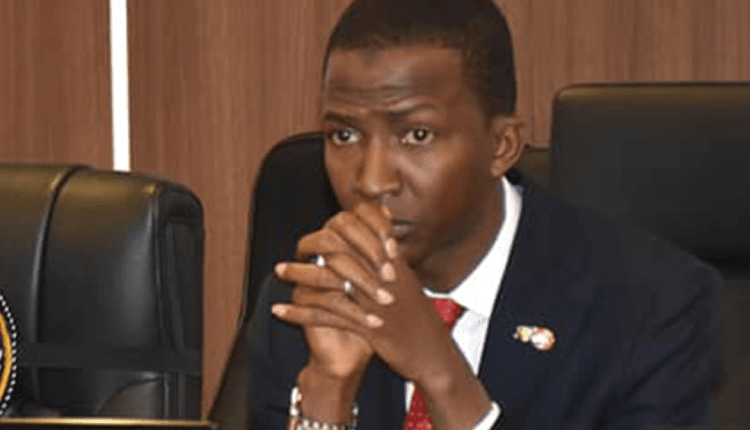We are saddened to have to repeat on these pages that Nigeria’s constitution does not permit for the indefinite detention of citizens without charge. On June 14, operatives of the Department of State Security (DSS) arrested the Chairman of the Economic and Financial Crimes Commission (EFCC), Abdulrasheed Bawa, hours after his suspension by President Bola Ahmed Tinubu. Since then, nothing has been heard of him.
Bawa’s case bears some similarities with that of Mr Godwin Emefiele, the suspended Governor of the Central Bank of Nigeria (CBN). Emefiele was also arrested by the DSS just a few days before Bawa. And like Bawa, he too spent weeks in DSS detention without charge until a court ordered his arraignment in court or his release. Emefiele was subsequently charged to court for illegal possession of firearms and ammunitions, granted bail, but then re-arrested by the DSS for a yet to be disclosed offence.
Still, Bawa’s case is different in several respects. Bawa has not even been accused of any charges by the DSS at all. And unlike in the case of Emefiele, there is no indication that the DSS has obtained a court order for Bawa’s continuing detention without charge. There has been no explanation to the Nigerian public, whatsoever, for his arrest and detention. Nor is there any clarity as to whether his family members, doctors or lawyers have access to him. The DSS has so far kept mum, as if Bawa never existed as a human person, or as a Nigerian citizen with fundamental rights, or as if he was not in fact a sitting head of an anti-corruption agency.
We strongly condemn the continuing detention of Mr Bawa without his formal arraignment in court. The DSS is a state agency created by law; it must thus operate under the law. For sure, the DSS has the right to invite or arrest any Nigerian or non-Nigerian in Nigeria to appear before it and answer questions pertaining how their activities might threaten or affect Nigeria’s internal security in any way. But that right comes with the responsibility to operate according to the dictates of the law at all times.
Zulum orders crackdown on “Marlian” group
Unity schools: Parents worry over poor learning, feeding
The law does not give any entity or person a blank cheque to arrest and detain Nigerian citizens for weeks on end without any evidence of a warrant to that effect by a court of law, or without reading them their charges in court. By continuing to detain Bawa for weeks after his arrest without any charges being brought forward against him in court amounts to denial of his fundamental rights under the constitution of the Federal Republic of Nigeria.
Personal liberty is a fundamental right guaranteed to every Nigerian citizen by the 1999 Constitution. That right applies as much to public officials as it does to ordinary citizens. It applies even to accused persons, no matter the alleged wrongdoing, since any restrictions on the personal liberty of accused persons also be in accordance with the law. The right to personal liberty requires that the arrest and detention of any individual must be in accordance with the law.
Section 35(1) of our 1999 Constitution makes clear that: “Every person shall be entitled to his personal liberty and no person shall be deprived of such liberty save in some case and in accordance with a procedure permitted by law…”. The Constitution then goes further to list six circumstances under which certain restrictions on the personal liberty of citizens are permissible. Even then, Section 35 (4) says categorically that where a person is lawfully arrested, they must be charged to court within “a reasonable time”, which it defines as no more than a period of two days. Of course, exceptions are allowed to this general rule, but those exceptions, too, must be in accordance to the law.
For the arrest of Bawa, the DSS has simply ignored the law, or at least, not publicly demonstrated that it has followed it. And it is this disdainful silence by the DSS to the requirements of the law on a matter pertaining to the fundamental right of a citizen that many Nigerians find distasteful.
Moreover, Bawa was, until his suspension by the President, the head of the EFCC, an agency charged with fighting corruption. What signal would his removal, arrest and detention without charge by a new administration send to Nigerians and the world about this government’s anti-corruption credentials? As long as the government and the DSS continue to keep mum on these questions, so long would many Nigerians fill in the gaps with their own conjectures, however far-fetched. The DSS should either charge Bawa to court without further delay or release him.

 Join Daily Trust WhatsApp Community For Quick Access To News and Happenings Around You.
Join Daily Trust WhatsApp Community For Quick Access To News and Happenings Around You.


